A-Rod: The Many Lives of Alex Rodriguez (20 page)
Read A-Rod: The Many Lives of Alex Rodriguez Online
Authors: Selena Roberts
Tags: #Non-Fiction, #Biography
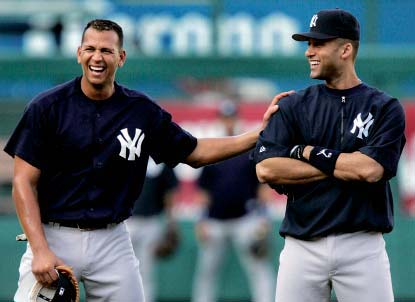
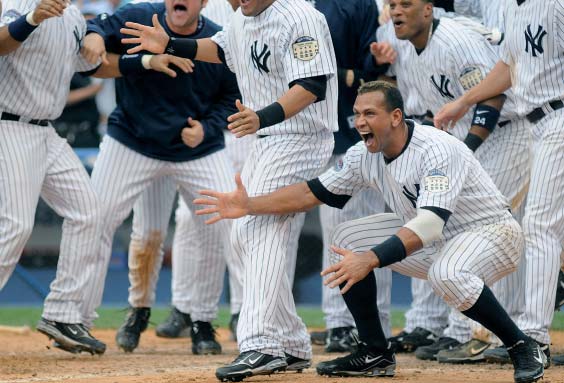
Desperate to leave Texas,
Rodriguez joined Joe Torre’s Yankees with great expectations and two humbling conditions: he had to switch his uniform number from 3 (which belonged to Babe Ruth) to 13, and he agreed to play third base in deference to Captain Derek Jeter, against whom Rodriguez had always measured himself.
Rodriguez won two more AL
MVP Awards, in 2005 and
PETER MORGAN/REUTERS/CORBIS
2007, but has never won a
World Series; Jeter has won four.
ROBERT GALBRAITH/REUTERS/CORBIS
E
IR
WSSE
S PRU
—ASOR
O DESSAMOT
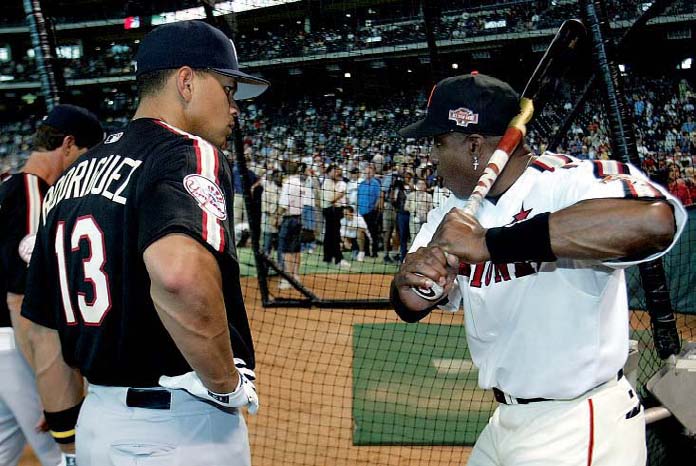
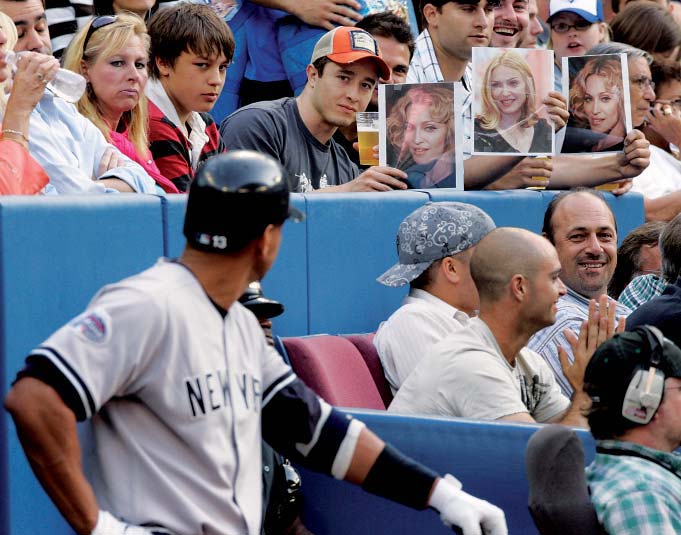
THE COMPANY HE KEEPS
Rodriguez at the 2004 All-Star Game with Barry Bonds, baseball’s all-time home run king, who has also been accused of using steroids. JEFF MITCHELL/REUTERS/CORBIS
Below:
Rodriguez is taunted by Toronto fans for his close friendship with Kaballah teammate Madonna. MIKE
CASSESE/REUTERS/CORBIS
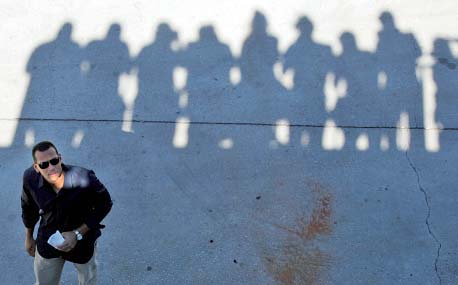
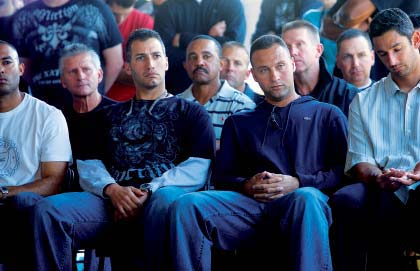
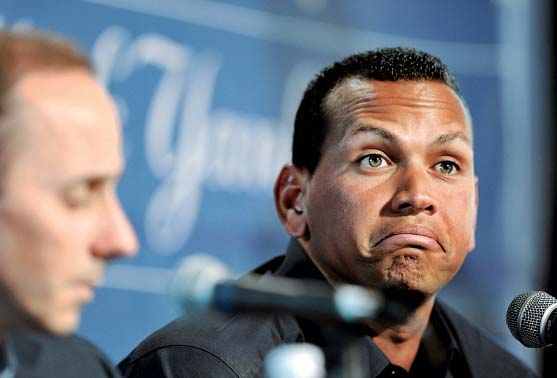
SHADOW OF DOUBT
At a press conference in Tampa on February 17, 2009, Rodriguez admitted to steroid use from 2001–2003, saying, “I knew we weren’t taking Tic Tacs.”
AP PHOTO/MARY ALTAFFER
From left:
Teammates Mariano Rivera, Andy Pettitte, Derek Jeter, and Jorge Posada watch Rodriguez discuss receiving injections from his cousin. At a similar press conference one year earlier, Pettitte confessed to having used human growth
hormone (HGH).
CHRIS LIVINGSTON/ICON SMI/CORBIS
UNSTRUNG HERO
Sitting next to Yankees general manager Brian Cashman, Rodriguez told reporters, “The last 15 months have been very, very tough. I’ve been through divorce, I’ve been through tabloids, you name it. I miss playing baseball and simply being a baseball player.” AL MESSERSCHMIDT/GETTY IMAGES
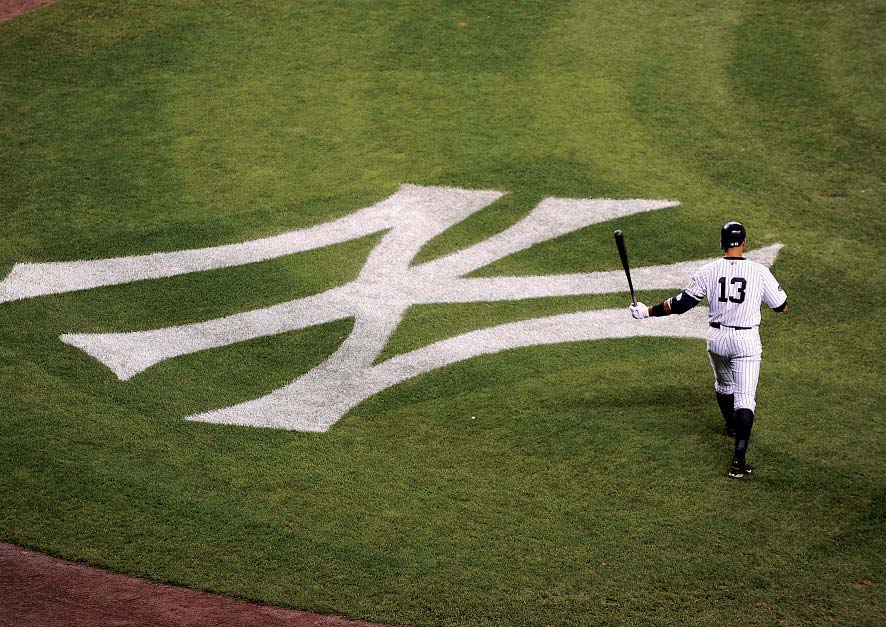
THE HALL OF FAME QUESTION
His prodigious stats suggest that Rodriguez will be considered one of the greatest players in baseball history, but voters for the Hall of Fame have shunned those who took steroids to prolong their careers. How will they treat someone who may have been “using” from day one? ANTHONY J. CAUSI/ICON SMI
been Alex’s go-to parent at the Miami Boys & Girls Club since he was seven years old.
He was one of the few people who would challenge Alex and set him straight. He would talk to him about sportsmanship and attitude. If Alex even tossed a bat in anger during a game, Eddie was there to call him out. “They drifted apart,” one person close to Eddie says. “Alex wasn’t listening to anyone anymore.”
Alex stuck with Presinal. In the spring of 2003, Alex had ingested supplements and stimulants, injected steroids and rubbed on balms to prevent wilting. Presinal used every trick in his bag to heal Alex’s neck. He wasn’t completely at full strength, but on April 2, 2003, Alex hit his 300th career home run, making him— at 27 years and 249 days old— the youngest player to reach that milestone, breaking by 79 days the record set by Jimmie Foxx.
His power was curtailed, though, and he was enduring more 0 for 4 games than usual. The Rangers didn’t fare much better. They were 10–14 by April 26 and got worse from there. In June, the Rangers won only 7 games and lost 20. Hicks was simmering as he watched The Worst Team Money Can Buy fl ounder. In the
Atlanta Journal-Constitution
, Thomas Stinson wrote, “Strapped with a payroll that dedicates 34 percent of its $103.5 million to two players this year— A-Rod at $22 million and Gonzalez at $13
million— spending more for pitching help has become impossible.
The road to insolvency is strewn with those who try to spend with New York’s George Steinbrenner.”
Hicks was not The Boss, but he was The Owner. He eventually stopped consulting with Alex on personnel issues (that direct line of communication had irritated both other players and Showalter) and began talking about ditching his marquee players for a younger, cheaper future. This was welcome news for Showalter, who preferred working with low-maintenance, young prospects. By the end of June, it was reported that Hart was in trouble. None of his 2002 signings was working out: Chan Ho Park was a disaster;
Rocker and Van Poppel had already been released. Hart’s team was the “train wreck” he had once mocked.
By the All-Star break, there was trouble in the clubhouse once it became clear that Carl Everett and Juan Gonzalez, among other stars, were being shopped. Alex was still hurting. “I don’t remember the last time I felt a hundred percent,” he said in July.
Alex had plenty of people in addition to Judy and Presinal holding his hand. At home, Cynthia had fl own the bodybuilder Jenny Worth in as her private trainer. She and Alex also welcomed in the trainer Dodd Romero and his wife, Sabina, on occasion. The guests cooked and trained Alex and Cynthia throughout 2003.
By Alex’s standards, his .285 batting average and 22 homers by mid-July were a major disappointment. He didn’t blame his neck injury, though. Instead, he ripped the Rangers organization. In the July 30 edition of
USA Today
, Alex told the columnist Jon Sara-ceno, “This is the fi rst year where the performance of the team has actually affected my play— and there’s absolutely no excuse. This is the fi rst year I’ve felt like this losing is wearing on me. Mentally, I haven’t been as honed in on my craft. I think it’s three years of the same thing.”
After digging himself a hole, he jumped into it: “At some point, if we don’t turn it around, I will defi nitely be having a conversation with our owner. If he feels he has a better chance of winning without me, then I’d [discuss it]. I want what’s best for both of us.”
Note the “selfl essness” of that last sentence, a perfect— and typical— A-Rod pronouncement. Those remarks did not sit well with his teammates, who already had a nickname for Alex— “The Cooler,” as Ken Rosenthal of the
Sporting News
would later report.
The moniker was rooted in this undeniable fact: He cooled off every team he played for. After Alex’s
USA Today
interview, Rosenthal wrote, Alex had planted the seed of his discontent in the paper to take what “amounted to the fi rst step in his new marketing
campaign. He is as manipulative as the player he modeled himself after, Cal Ripken Jr.”